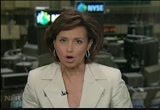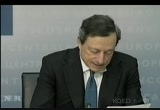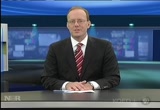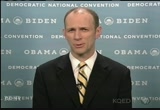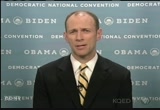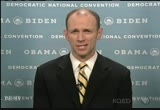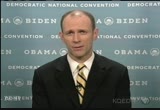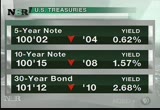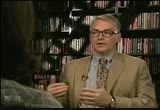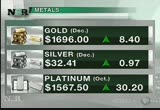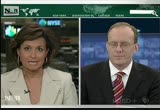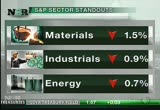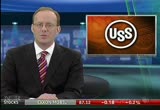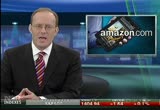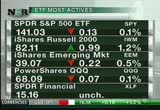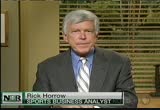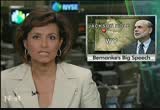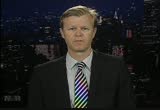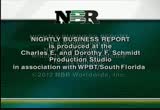tv Nightly Business Report PBS September 4, 2012 6:30pm-7:00pm PDT
6:30 pm
>> this is nbr. captioning sponsored by wpbt >> susie: i'm susie gharib. september is historically the worst month for stocks. what can investors expect this time around? >> tom: i'm tom hudson. the democratic national convention is underway in north carolina. we talk with austan goolsbee. he's the chief economist on the president's economic recovery board. >> susie: and gas prices are up, but consumers were scrambling to buy new cars. we'll find out why auto sales were so revved up in august. >> tom: that and more tonight on nbr! >> susie: back to business, back to school, and back to another cautious day on wall street. stocks were mixed on this first trading day of september as
6:31 pm
investors sorted through a new batch of economic numbers. manufacturing activity in the u.s. dropped for the third straight month. the institute of supply management's gauge of manufacturing slipped in august to 49.6, the lowest reading in two years. american factories have been a critical source of new jobs. a separate report showed that spending on construction projects in july dropped. that decline comes after three months of gains. all that discouraging news weighed on stocks. the dow lost 55 points, the nasdaq added eight, and the s&p fell by almost two points. >> tom: all this data on the economy comes as we begin what's traditionally the toughest month to be a shareholder. there's no shortage of uncertainty this september for
6:32 pm
investors-- the election in full-swing, europe and the approaching tax hikes and spending cuts. here's suzanne pratt. >> reporter: august on wall street can be downright dull, with little volume and few headlines. but history shows september can be trouble, particularly for stock investors. since 1929, the s&p 500 has lost an average of 1.2% in september, making it the worst month of the year for stocks. there are plenty of theories for this phenomenon, including mutual fund window dressing and worries about october, which is known for big sell-offs. and some pros predict this year will be no different. >> it's probably got a 60% to 65% chance of being a down year. and i say that only because you've got all these financial balls in the air. will the european central bank be able to pull everything together? >> reporter: others say, because
6:33 pm
this is a presidential election year, it could be better for the stock market. >> the decline tends to be a little bit more muted. it's still in the negative zone, but by less than one half of 1%, on average. so really, you're just catching your breath in september in an election year. >> reporter: it is of course impossible to say for sure whether this september will finish positive or negative for stocks. but many pros agree it will definitely be volatile. beginning this week, the calendar is jammed with news events. thursday, look for the european central bank meeting to generate headlines about its bond buying plan. friday, u.s. financial markets will be fixated on the monthly employment data. and there has also some talk recently of a correction in stock prices. >> the market is ripe for some sort of digestion of recent gains. but our belief is that it's not ready for a correction, meaning
6:34 pm
a decline of 5% or more. valuations right now are still trading at a more than 21% discount over the last 24 years. >> reporter: one more reason september could be rough for stock investors: simple profit- taking. after all, the s&p 500 is up 10% since june. suzanne pratt, nbr, new york. >> susie: in europe today, there were more signals the european central bank may launch new strategies hoping to stabilize the government debt crisis on the continent. e.c.b. president mario draghi suggested the bank could buy government bonds that last up to three years, with the goal of reducing borrowing costs. and a top central banking official said its latest interest rate cut isn't helping as much as it should, blaming it on the differences in borrowing costs across the 17 euro-zone countries. these comments come as the european bank meets this week. >> mainly, the question is how much will they buy, from what part of the curve, and will they
6:35 pm
try to target a yield cap for spanish and italian government debt. those are the three key questions coming out of this meeting. >> susie: the european bank meeting comes less than a week before the federal reserve meets here in the u.s. >> reporter: i'm sylvia hall in washington. still ahead, as a.m.r. and u.s. airways join the ranks of companies hoping to merge, they'll also face scrutiny from the nation's regulators. we look at how the federal government views competition these days. >> tom: the democratic national convention is officially underway in charlotte, north carolina. first lady, michelle obama takes center stage with the prime time speech expected to focus on the personal side of president obama, but likely will be an economic message as well. the president has been focusoth middle class in recent campaign appearances looking forward to the convention speech on thursday night, and stay focused. >> the former chairman of the white house council of
6:36 pm
economic advisers joins us from the convention. austan welcome back to nbr. are americans better off now than four years ago? now do you answer that? >> on average yes. >> in 200 noox*ib, it was january but one of the first economic months in this country. we lost 800,000 jobs, and the stock market collapsed a net worth of something like 40%. so i think we're a long, long way that from, and anybody who thinks that they would like to trade places with last month versus january, 2009, but likely asleep then. >> we asked are they as good today as they thought they would be four years ago'd: perhaps there's a more
6:37 pm
difficult question for the administration, isn't it? >> if you're asking, is this perfection? no. we have a long way to go, sxnt just the united states. if you look around the world, the world economy has been hurtings for two years plus, so i think we've got a long way to go, and we ought to be doing things to get the growth rate higher. but the question of would you rather be living in january, 2009, when the economic team incoming, you're about to be in the great depression, you better figure out what you're going to do once the depression has started that was a black hole that we did not go into. >> president gave himself an incomplete. you were in the white house during the financial and the health care debate.
6:38 pm
and the debate on whether to raise the debt ceiling. you pointed out more needs to be done. >> i would say in the immediate term, we have to put focus on getting the growth rate up, and getting the growth rate going. it should be on private sector growth, and focus on experts and the focus on trying to focus on getting people to stay in their houses and the equivalent tax cut, and then deficit reduction. >> it's debateable what we'll here hear in the next three nights, did the president fail in housing? should more have been done in
6:39 pm
the last four years? >> the president has done a lot. there's still a huge problem in housing. that problem is rooted in the fact that we had the biggest housing bubble in the history of this country, and we overbuilt, and now there's 5 million vacant homes. so to some extent so there's no mablgic waund. but trying to allow people to refinance and take advantage of the low rates makes tons of economic sense, and we ought to do everything we go to do that. >> the market is belgs us to convert some of the properties to rental propertys to try to relieve the housing crisis that's facing a lot of people. we should do more on housing.
6:40 pm
>> we'll see if you're colleagues have more to say. >> we have austan goolsbee, the former chairman of economic advisers from charlotte. >> susie: auto sales surged in august. consumers swooped into showrooms, buying everything from small compacts to pickup trucks. as diane eastabrook reports, auto companies are heading into the fall with the pedal to the metal. >> reporter: if you're looking for signs the economy's improving, head to an auto dealership.
6:41 pm
august was a blockbuster month across the board for the industry. on the domestic side, chrysler led the pack with a year-over- year sales increase of 14%. ford and g.m. weren't far behind, with respectable gains. sales were even more impressive on the import side. volkswagen tallied a 62% increase in sales. japanese companies continued to rebound from last year's tsunami. honda's sales were up 59%, followed by a 46% increase at toyota. sales of south korea's hyundai were up 4%. the big drivers of sales last month continued to be an aging vehicle fleet, consumers having better access to credit, and for general motors, improvement in the housing market. >> we are definitely seeing an uptick in the housing industry, which is one of the things that we feel very good about because that is very correlated with pickup sales. our pickup sales were up 6%, and
6:42 pm
actually up 31% month over month. >> reporter: still, smaller, more fuel efficient cars like the chevy cruze were even bigger hits. and even though many americans are downsizing what they drive, they aren't skimping on their ride, opting for upgraded options. that helped account for a higher average transaction price last month versus the same time last year. the average price is now just over $30,000. while the rest of the economy seems to be stuck in neutral, auto sales have been motoring along. still, there have been potholes along the way. last month, sales for g.m. and ford went into reverse. economists think more new products coming to market this fall will keep customers flocking to showrooms and keep the sales momentum going. diane eastabrook, nbr, chicago. >> tom: on thursday, we'll show you g.m.'s latest entry to the sub-compact market when diane takes the chevy spark for a spin. >> susie: a corporate merger over office products could face
6:43 pm
big opposition from the justice department. according to bloomberg, the federal government may block 3m's buyout of avery dennison's office products business. this is just the latest potential deal to face such scrutiny. a tougher regulatory environment could also greet a possible deal between u.s. airways and american airlines' parent company, a.m.r. sylvia hall takes a look at how regulators view competition these days. >> reporter: as a.m.r. and u.s. airways lift off toward a merger, they could face a bumpy flight. in general, regulators are showing a stronger willingness to crack down on deals they think would hurt competition. >> i think this is a critical time for anti-trust enforcement. obviously, as the economy is growing out of the recession, we need markets as competitive as possible. >> reporter: as the economy crawls out of recession, there's a perceived uptick in corporate deal-making. last week, rental car company hertz announced it would buy
6:44 pm
dollar/thrifty, and health insurance provider wellpoint is trying to merge with amerigroup, a medicaid provider. but recently, the department of justice has shown its teeth when it comes to consolidation. last year, it blocked major deals between at&t and t-mobile, h&r block and tax act, and nasdaq and n.y.s.e. euronext. it did allow comcast and nbc to combine, but with strict conditions attached. >> i think most mergers get approved, regardless of the administration. i think, at the margin, there's been a little bit less predictability with this administration >> reporter: attorney j. mark gidley says this administration's guidelines for mergers, introduced back in 2010, give regulators more room for interpretation. they also leave businesses with a lot to consider before a merger. >> i think, in the past, it was a lot easier for a lawyer to say "yeah, you should be fine. there's ten competitors. it will go through." i think it's harder to predict now, and a board of directors, or two board of directors have to take a little bit more of a jump-off-the-cliff attitude with a merger.
6:45 pm
>> reporter: but some say the agencies haven't gone far enough to protect competition, and in some cases, if a business is struggling, like american airlines, which is in bankruptcy, deals are viewed more favorably, says attorney david balto. >> democratic anti-trust enforcers are more flexible when looking at flailing or failing firms, and are more willing to see... to permit firms to consolidate in order to, for example, preserve jobs and achieve the most efficient use of resources. >> reporter: one place the administration has been especially willing to act is the technology sector. and in this quickly changing industry, new questions are arising. anti-trust action there could boost competition now, but some people worry that too much intervention could harm innovation in the future. sylvia hall, nbr, washington. >> tom: the new york state attorney general is taking a closer look at private equity firms and what they pay the tax man. specifically, if some of the nation's biggest private equity firms abused a tax strategy on management fees to cut their tax bills by millions of dollars. "the new york times" reports the
6:46 pm
state prosecutor has subpoenaed more than a dozen firms in recent weeks. the i.r.s. looked into private equity management fees five years ago. while it called them, "areas of possible non-compliance" the agency gave no formal guidance on the strategy. >> susie: apple fans are counting on the launch of a new iphone, and the guessing is september 12 is when apple will announce the iphone 5. apple sent out this invite to the media today for an event on september 12, saying simply, it's almost here." the invitation comes as the iphone gained ground among smart phone users in the latest quarter.
6:47 pm
comscore tracks the industry, and says apple's share of the smart phone market rose to over 33% during the second quarter, or one in every three phones. still. that's far behind the android platform's dominance, with a 52% share of the smart phone market. tom, apple stock has been on the rise on rumors of not only a new phone, but also a new mini ipad and a tv product. in august, apple shares rose almost 9%. >> tom: a lot going on. nokia with an announcement tomorrow let's get going with tonight's "market focus." the major indices finished this first trading day of september mixed. but they were able to pare back earlier losses. selling on the s&p 500 picked up after the disappointing
6:48 pm
manufacturing data we reported at the beginning of the program. the index hit its lowest price of the day about an hour after that report. it popped positive late this afternoon, only to end down a fraction. trading volume picked up. 637 million shares on the big board; 1.5 billion traded on the nasdaq. the materials sector saw the biggest drop, down 1.5%. industrials fell nine-tenths of a percent, the energy sector was down seven-tenths of a percent. weighing heavily on the materials sector, worries about global demand for steel, thanks to the combination of economic worries, slowing chinese demand, and lower prices. cliff's natural resources has felt the brunt as a producer of coal used in steel-making. shares fell another 6% today on heavy volume. this takes the stock down to its lowest level since 2009. the stock is down 57% for the year. it's the drop in steel-making coal prices that has hurt the energy stock sector.
6:49 pm
coal miners alpha natural resources, consol, and peabody all continue to see volatility. alpha natural is at a new 52- week low, down 6.9%. consol fell 4.5%, announcing it will suspend operations at one of its biggest mines due to weak demand. peabody was down 3.4%. it's not just coal used for steel-making that has seen lower prices; so has steel itself, and that continues to weigh on steel stocks like u.s. steel. shares fell 3.4% to close at a one month low. the company was able to hammer out a tentative labor contract with 16,000 union members. it's a three-year deal which the rank and file will vote on. there was some deal-making over the labor day weekend, including a cross-border drug deal. the buyer is canada's valeant pharmaceuticals; the seller is medicis. it's a $2.6 billion deal offering medicis shareholders $44 per share.
6:50 pm
medicis concentrates on dermatology treatments. the market certainly likes the combination. medicis' shares shot up more than 38%, closing just below the buyout offer. valeant stock also jumped, up 14.6%. this is almost a two year high. valeant has done more than a dozen buyouts this year. it was a different kind of deal for amazon.com. the online retailer struck a partnership with epix, a hollywood movie studio consortium made up of lions gate entertainment, paramount pictures, and mgm. the deal adds about 3,000 titles to amazon's streaming video library. previously, epix films were exclusive to netflix, but that deal expired. despite winning the content away from a competitor, amazon shares were down a fraction. however, they did hit a 52-week high during today's session. the netflix chart looks quite different. the stock fell 6.4% on heavy volume, ending just above its 52-week low. campbell soup earnings were hotter than anticipated, thanks to the company breaking a two- year run of declining soup
6:51 pm
sales. in hopes of building on that, the company plans to introducing 50 new soups and meals in the next 12 months. shares didn't move, falling just a fraction, even though volume more than tripled. but there's a lot more to this stock chart. we have a closer look on our web site, nbr.com. click on the blogs section for technical analysis by michael kahn. three of the five most actively traded e.t.f.s were down. the lone exceptions-- the russell 2,000 fund up 1.2%, and the financial sector fund was unchanged. that's tonight's "market focus."
6:52 pm
>> susie: "want" versus "need"-- this is a common question for americans on just about every purchase they make these days. even sports teams realize that, in this weak economy, they have to be more competitive with their ticket prices. here's rick horrow with tonight's "beyond the scoreboard". >> reporter: average ticket prices for the four major u.s. pro sports leagues continue to rise despite the unstable economy. however, the rate at which they increased slowed dramatically in the three years after the 2008 financial crisis compared to the three years prior. based on analysis of team marketing report's annual fan cost index of the leagues, only the national hockey league saw larger ticket price increase during and after the recession. by comparison, major league baseball's ticket prices increased 15% from 2006-2008, but just 1% from 2009-2011. in addition to the economy, pro sports teams trying to determine
6:53 pm
ticket prices also had to deal with technological advances in the home viewing experience. for the price of a season ticket, fans can buy the newest and biggest high-definition tvs, allowing them to watch games in the comfort of their living room without having to worry about parking, long lines, and expensive concessions. as player costs rise, ticket prices will continue to increase as well. therefore, teams should find ways to add value to tickets, rather than arbitrarily inflate the price. otherwise, fans will be less inclined to spend their discretionary income on live sporting events, and teams will have to spend more money trying to win them back. >> we've done well, but our profits have shrunk and gotten eaten up by a lot of other things-- insurance, taxes, and other things, rent, etc.
6:54 pm
>> the downward spiral that everybody was in, the depressing mood the country was in, it's finally over and i see things getting better. >> tom: tomorrow on nbr, asking americans the question of the moment-- is the economy better off than it was four years ago? we'll get some perspective from small business owners. >> susie: ben bernanke put on a vigorous defense of the federal reserve's controversial bond- buying strategy known as quantitative easing on friday. but tonight's commentator says the fed chairman failed to mention the havoc that strategy has caused in the currency market. he's michael casey, columnist at dow jones. >> mr. bernanke made no mention of many foreign governments legitimate complaints that the feds q.e. programs tend to drive down the value of the dollar and push up their currencies' exchange rates. in past rounds, the hundreds of billions in freshly minted dollars that were issued to buy bonds largely flooded into emerging markets, where higher interest rates and stronger
6:55 pm
growth made their currencies an attractive alternative to a weakening dollar. chastened by the blow to export competitiveness they experienced, many governments won't sit back now if, as mr. bernanke hinted, the fed opts next week for a third round of post-crisis q.e. but if other countries follow brazil's lead and meddle with exchange rates, the money will simply flow into freer floating currencies such as the australian dollar and the chilean peso. at a time of weakening global demand, that's an unfair burden for such countries to bear. what's to say they won't eventually intervene as well? such tit-for-tat responses raise the risk of an all-out currency war, a 1930s-style threat to international trade that the fed, the steward of the world's reserve currency, has a responsibility to avoid. i'm michael casey. >> tom: that's nightly business report for tusday, september
6:56 pm
404 Views
Uploaded by TV Archive on

 Live Music Archive
Live Music Archive Librivox Free Audio
Librivox Free Audio Metropolitan Museum
Metropolitan Museum Cleveland Museum of Art
Cleveland Museum of Art Internet Arcade
Internet Arcade Console Living Room
Console Living Room Books to Borrow
Books to Borrow Open Library
Open Library TV News
TV News Understanding 9/11
Understanding 9/11
